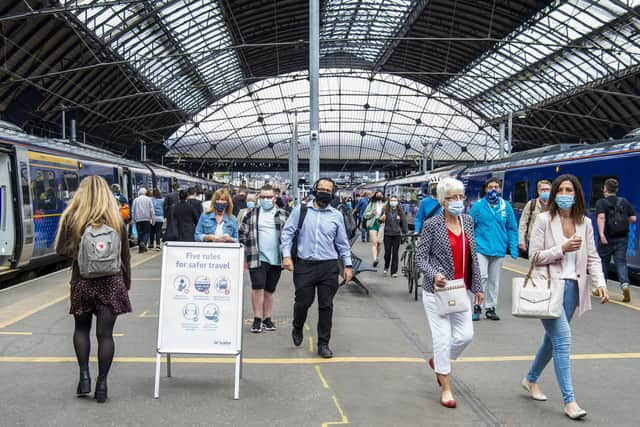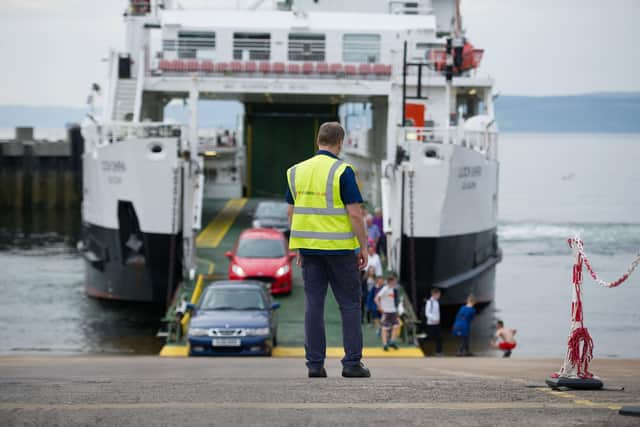Insight: Will the Omicron surge drive passengers off trains and buses as staff absences mount?
The problem has taken centre stage for Scotland’s major transport operators since First Minister Nicola Sturgeon revealed nine days ago that 60 ScotRail trains had been cancelled because of workforce absences, with the number increasing to 150 a day last weekend among its 2,000 scheduled daily services and totalling some 700 by Friday.
Bus operators have faced similar problems, exacerbating driver shortages caused by Brexit, training delays and the lure of higher pay for driving lorries.
Advertisement
Hide AdAdvertisement
Hide AdMSPs have complained of bus passengers being left stranded by sudden changes, while islanders have seen their sole link to the mainland temporarily suspended after CalMac ferry crews were forced to self-isolate.


The outlook is grim for Scotland’s already-struggling transport sector, with Omicron threatening to wipe out the rebuilding of passenger numbers after successive lockdowns cut traffic to as little as 5 per cent of pre-Covid levels.
Figures provided to Scotland on Sunday by Transport Scotland showed rail travel between last Monday and Thursday fell by 13 per cent compared to two weeks previously, with car traffic down by 8 per cent, although free bus travel, such as by the over 60s, was up by 1 per cent.
Rail was also down by 53 per cent compared to the same period in pre-Covid 2019, bus by 41 per cent and car by 16 per cent.
‘Planning extensively for all eventualities’


ScotRail is among train operators considering reducing timetables further in an attempt to provide a more robust service, while other transport firms such as Edinburgh Trams and CalMac have contingency plans in case staff absence levels rocket.
At ScotRail, up to 150 staff a day were off last week, including, crucially, dozens of drivers.
A spokesperson said: "As part of our contingency planning, we are looking at various timetable options to provide customers with some level of certainty should the number of Covid-related absences rise significantly.
"The level of changes would be dependent on the severity and locality of cases, but we are planning extensively for all eventualities.
Advertisement
Hide AdAdvertisement
Hide Ad"Strict physical distancing is not currently part of the [Scottish] Government guidelines for public transport, but we would hope customers would spread themselves out on trains where possible to limit their interaction with each other.”
Airlines are also contemplating short-term cuts, despite the recent flurry of holiday flight announcements for next summer.
No-shows
A Scottish airport source said some aircraft were flying with up to half as many passengers as just a few weeks ago – similar levels as at the height of the pandemic last year.
Both Edinburgh and Glasgow airports said passenger cancellations and no-shows were on the rise.
The Scottish Government has already ploughed in hundreds of millions of extra funding to keep ScotRail going through the pandemic, while passengers face a 3.8 per cent fares increase next month which will be the highest for nearly a decade because of rising inflation.
It will also be introduced two months ahead of the rest of Britain.
The uncertainty, extra cost and fears over infection have triggered predictions of an increase in road traffic as passengers forsake public transport for their cars.
Passenger watchdog Transport Focus said public transport faced a “really challenging” 2022.
Advertisement
Hide AdAdvertisement
Hide AdChief executive Anthony Smith said: "The Scottish and UK governments’ warnings about the spread of the virus and likely increased restrictions are going to dampen demand for public transport considerably in the New Year.
"For those who rely on public transport, the staffing situation and staff being ‘pinged’ is going to make running reliable services very difficult.
"I expect we will see much-reduced timetables, but at least they will be deliverable."
Stranded
Scottish Greens transport spokesperson Mark Ruskell, leading a Holyrood debate on the threat to rural buses last week, told MSPs: “Omicron poses a further challenge.
"Over the past week, more public transport staff have been off sick.
"That has led to short-term cancellations that have left many of my constituents stranded.”
Some bus operators have been reluctant to provide details of their cuts, with Stagecoach saying only it continued to run “the vast majority of our planned services”.
However, Scottish Greens north east Scotland MSP Maggie Chapman told the debate that in Inverness a week ago the company had withdrawn “a host of services for the second time in two months due to staff needing to self-isolate”.
Advertisement
Hide AdAdvertisement
Hide AdThe IAM RoadSmart motoring group warned such moves could create a vicious circle.
‘Personal health crisis’
Neil Greig, its Scotland-based policy and research director, said: “Poor reliability of services due to isolation of staff is just one of many reasons why people are choosing to get back in their cars.
"We are concerned that the longer the pandemic restrictions continue, the chances of causing long-term decline in bus and train use increases.
“In a personal health crisis, the car looks even more attractive, particularly when combined with more working from home and less need to commute on congested roads.
"Restoring confidence in the safety of public transport is going to be vital to the economic and environmental future of our towns and cities.”
Steve Gooding, director of the Royal Automobile Club Foundation, agreed.
He said: “With the First Minister asking Scots to ‘think very carefully’ about their social interactions, people will naturally hesitate before using public transport and are likely to rely on their cars for getting around.
"These are, after all, private bubbles which isolate their occupants from wider social contact.
‘Significant minority reliant on public transport’
Advertisement
Hide AdAdvertisement
Hide Ad“After the disappointment of last year, nobody wants to risk ruining their Christmas by catching Covid so close to the 25th, hence the likelihood they will avoid trains and buses.
"That does mean roads could be busy next week with Scots who’ve dodged the virus making well-deserved trips to see loved ones.”
But Gooding added that some Scots did not have that choice.
He said: “Whilst more than seven out of ten Scottish households have access to at least one car, that still leaves a significant minority reliant on public transport whatever the relative danger of infection might be.”
‘Little evidence public transport swapped for the car’
Professor Achille Fonzone, of the Transport Research Institute at Edinburgh Napier University, said: “In the absence of specific regulations, we can expect a decrease in the use of public transport due to the fear of infection and so – above all if working patterns do not change – an increase of car use.
"A reduction in patronage of public transport would be a further financial blow to an industry hit very hard in in the first stages of the pandemic, which may have repercussions on the service.”
However, Professor Iain Docherty, of the University of Stirling, said: “There is very little evidence that people are actively swapping public transport for the car to undertake the same journeys, rather it is the kind of journeys they are making that has changed.”
The Confederation of Passenger Transport Scotland, which represents bus operators, said: “As cases rise across the UK, we are seeing more drivers needing to self-isolate.
"We are working hard with government and local authorities in a market where passenger numbers remain suppressed, because of the pandemic, to minimise any potential disruption.
Advertisement
Hide AdAdvertisement
Hide Ad“Any disruption that does occur will be temporary and we remain committed to growing bus use and providing a comprehensive, reliable, affordable bus network.”
A spokesperson for Edinburgh Trams said: “Whilst we currently have a low level of staff absence due to self-isolating, we have enough cover for operational staff that allows us to continue to run a full timetable.
‘Ensure lifeline services’
“We have contingency plans ready should absences exceed the cover available.
"This could include a temporary reduced timetable to ensure we maintain a consistent and reliable service.”
CalMac said Covid had forced reduced sailings on the Largs-Cumbrae route and cancellations between Oban and Lismore service.
The ferry operator said it had contingency plans to cover “possible scenarios such as a reduction in staff that might occur because of the impact of Covid and which are based on allowing us to react quickly to any situation as it occurs...to ensure we maintain lifeline services.”
A Transport Scotland spokesman said: “There have been some decreases on particular modes, but it is too early to draw firm conclusions about travel patterns.
“The First Minister was clear in her advice on Friday that in the run up to Christmas, people should stay at home as much as is feasible.
Advertisement
Hide AdAdvertisement
Hide Ad“It is important to prioritise the events and occasions that matter most to you for Christmas.
"Prioritising travel plans will help keep services running for those that rely on them most, including key workers.
"It will also help keep the staff providing essential public transport safe."
A message from the Editor:
Thank you for reading this article.
We're more reliant on your support than ever as the shift in consumer habits brought about by coronavirus impacts our advertisers.
If you haven't already, please consider supporting our trusted, fact-checked journalism by taking out a digital subscription.
Comments
Want to join the conversation? Please or to comment on this article.
